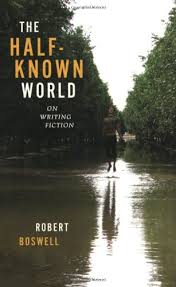Boswell, Robert (2008). The Half Known World. Mpls, MN: Gray Wolf Press
Robert Boswell presents 9 personal essays exploring different aspects of the craft of writing fiction, all addressing the idea that you should be writing about something that escapes complete comprehension. If you describe and show all aspects of your fictional world, then you are writing genre, or possibly a technical manual. Literary fiction is supposed to confront regions of human experience that are not fully susceptible to rational understanding. Consider what it would be like to come out of prison after 20 years and enter normal life. There’s a lot that can be said about that experience, and a lot that cannot be said. Boswell’s point is that you don’t need to say it all, and you shouldn’t.
It’s an interesting thesis, and it rings true, if you agree that literary fiction is an art form, and that the purpose of art is to use the form to convey something interesting about the human condition. The idea doesn’t stand as a universal prescription. Half known to whom? Someone who has given a great deal of thought to a topic may have more understanding of it and more to say about it than a naïve person. What’s half known to you might seem superficial to me. What I find utterly mysterious might be transparently simple to you.
At the other end of the spectrum, it seems to be true that nothing, nothing at all in human experience, can be fully comprehended. If you stare at a stone long enough, it becomes mysterious. Boswell’s dictum thus becomes a truism.
Perhaps his advice is really that you, the writer, should strive to confront whatever is only half known to you.
And then there’s the question of why you should do this. What makes this good advice for writers? Boswell doesn’t address that question squarely but merely gives multiple examples from literature of what he means by it. He suggests that a character that you only half understand might do something surprising, and presumably readers of literary fiction enjoy fresh, surprising material. As somebody famous once said, if the writer is never surprised, the reader surely won’t be. I’m not sure that’s true, but it might be.
The essays vary in interest and effectiveness. On writing characters, he contradicts many writing teachers who say you should know everything there is to know about your character before you start. Boswell says you should only know one or two essential things. Get inside those, and something surprising might arise from the unknown part.
To surprise the reader, a character can show a surprising change, or a social paradigm can change, such as after a revolution, either martial or cultural; a setting can radically change, such as getting out of prison, emigrating, getting elected, becoming disabled. One chapter discusses the technique of switching foreground and background for a surprise, but it emphasizes that themes (as with symbols and other devices), must evolve organically. If you plant your theme or symbol, it will stick out as a crude device.
One excellent chapter discusses the omniscient narrator, one who knows everything and is judgmental about it all. That’s relatively rare these days. Today we prefer third-close or third-limited. We don’t trust a narrator with full omniscience. Boswell argues that omniscience is actually the best narrative voice for a mature writer who has something to say. It’s a detailed and compelling argument, perhaps the strongest in the book. In another strong essay, he summarizes an argument by Chomsky, delineating the social and moral responsibilities of any intellectual.
Some of the chapters are far weaker, some almost pointless rambles. And nearly all of the essays are slow in getting to the point, usually beginning with frustratingly irrelevant first-person anecdotes that may or may not illustrate the gist of the essay. These often feel like warm-up exercises. The last chapter is devoted entirely to one of these autobiographical indulgences, and while I admit it is really well-written, it has nothing to do with anything.
Overall, this is not a step-by-step how-to book, but a consideration of an idea that can make for good literary fiction.

